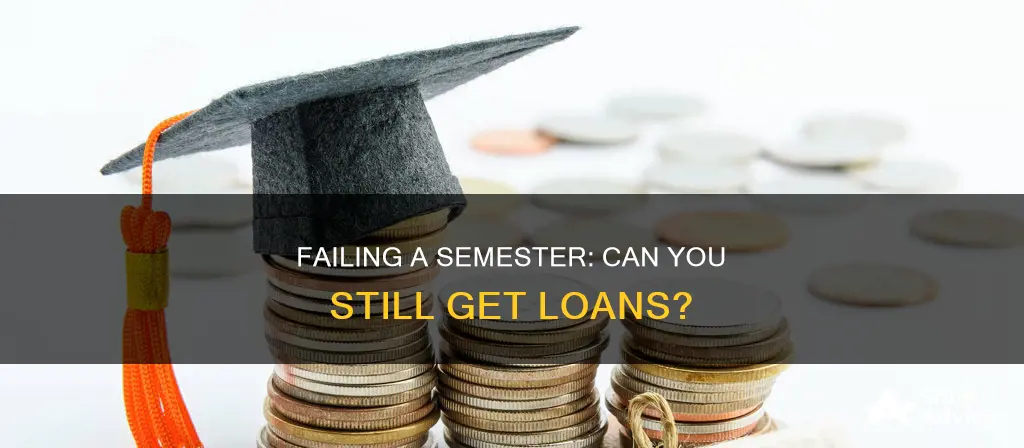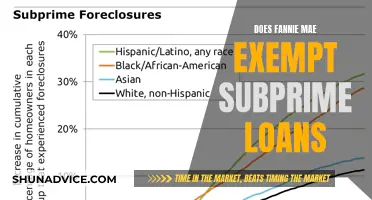
Failing a semester at college can be stressful for many students, and it can also have financial implications. While failing a semester does not automatically disqualify you from receiving loans, it can impact your eligibility for financial aid, including loans, scholarships, and grants. To maintain eligibility for federal student loans in the US, students must generally meet Satisfactory Academic Progress (SAP) requirements, which include maintaining a certain GPA and earning enough credits per semester. Students who fail a semester may lose their financial aid and may need to explore alternative financing options, such as private student loans, until they can improve their grades and regain eligibility.
| Characteristics | Values |
|---|---|
| Disqualification criteria | Failing to meet the standards for academic performance and progress |
| Impact on financial aid | May lead to loss of eligibility for federal student loans and other financial aid |
| Reinstatement | Possible through a reinstatement petition or by improving grades |
| Private student loans | Not typically affected by failing a semester, but may have enrollment requirements |
| Federal student loans | Require satisfactory academic progress, with a minimum 2.0 GPA |
| SAP requirements | Vary by school, but typically refer to earning enough credits and maintaining a GPA of at least 2.0 |
| Appeals | Possible under special circumstances, such as injury, illness, or family/health emergency |
| Emergency student loans | Low-dollar, short-term loans offered by some colleges and universities |
What You'll Learn

Failing a semester may lead to academic disqualification
The impact of failing a semester on financial aid depends on the type of aid received. Federal student loans and grants typically require maintaining "satisfactory academic progress," and failing to do so can result in losing eligibility. This includes meeting SAP requirements and maintaining a minimum GPA, often set at 2.0. Scholarships may also have specific GPA parameters, and failing to meet them can lead to disqualification.
On the other hand, private student loans usually do not have the same academic requirements as federal aid. Failing a class or semester may not directly impact private loan eligibility, but it can affect the student's overall academic standing. Private lenders may have enrollment requirements, such as being enrolled in a certain number of credits, which could be impacted by withdrawing from classes or failing to meet progress standards.
It is important to note that the specific policies and requirements may vary among institutions and financial aid providers. Students facing academic disqualification or loss of financial aid due to failing a semester should consult their institution's academic advising services and financial aid office to understand their options, such as appeals or reinstatement processes.
Explicit Costs: Are Loans Included?
You may want to see also

Losing financial aid eligibility
Failing a semester can put your eligibility for financial aid at risk. Federal student loans have eligibility criteria, and one of the requirements is that the student must maintain "satisfactory progress" in school. This includes being enrolled at least half-time and making progress toward a degree or certificate. Failing a class may disqualify you from federal student loans based on your school's SAP requirements. Federal student aid typically requires maintaining a 2.0 GPA to qualify.
If a student loses financial aid due to a failure to maintain satisfactory academic progress, they may be able to regain eligibility by getting better grades. However, until then, the student will be ineligible for financial aid and will have to pay for the college costs on their own. They will be ineligible for all forms of federal student aid, including federal education loans.
Students should always file an appeal if the failure to maintain satisfactory academic progress is due to extenuating circumstances. The appeal should document the special circumstances, such as a letter from the student's doctor, and explain how these circumstances affected the student's performance. It should also detail what has changed to allow the student's performance to improve. These are the only circumstances in which a student may fight to regain financial aid eligibility.
It is important to note that private student loans typically don't require you to maintain SAP like federal student aid, and they don't have GPA requirements. However, withdrawing from a class because you are at risk of failing might affect you. Private lenders may require you to be enrolled in a certain number of credits, and withdrawing could bring you below that threshold.
FAFSA Loans: Do They Cover Summer Classes?
You may want to see also

Maintaining eligibility for private student loans
Failing a semester does not automatically disqualify you from loans. However, maintaining eligibility for private student loans requires meeting specific criteria, and failing a semester can impact your eligibility. Here are some key factors to consider:
Academic Progress and GPA Requirements:
Most lenders of private student loans do not require you to maintain a specific grade point average (GPA) or Satisfactory Academic Progress (SAP). Unlike federal student loans, which typically mandate a minimum GPA of 2.0, private loans often lack academic requirements. Therefore, failing a semester does not directly affect your eligibility for private student loans in terms of GPA maintenance.
Enrollment Status:
To maintain eligibility for private student loans, you typically need to be enrolled at least half-time at an accredited institution. Withdrawing from classes or dropping below the required credit threshold could impact your eligibility. Ensure you meet the minimum enrollment requirements set by your lender.
Credit Score and Income:
Private student loans often have stricter credit score and income requirements than federal loans. Lenders usually conduct a credit check and may require a minimum credit score of 650 or higher. A stable income, typically around $35,000 annually, is also generally needed to demonstrate creditworthiness. Failing a semester does not directly impact these eligibility factors.
Citizenship and Age:
Eligibility for private student loans often requires borrowers to be at least 18 years old and either U.S. citizens or permanent residents. Some lenders may consider international students with a U.S. citizen co-signer. Failing a semester does not affect these eligibility criteria.
Qualifying Expenses:
Private student loan funds must generally be used for qualifying educational expenses, such as tuition, room and board, books, transportation, and technology. Your lender may also allow funds for personal expenses like food, clothing, and toiletries. Ensure that your expenses align with the lender's approved categories.
In summary, while failing a semester does not automatically disqualify you from private student loans, it's important to maintain your eligibility by meeting the requirements outlined above. Contact your lender directly to understand their specific criteria and any potential implications of failing a semester on your loan eligibility.
Fafsa and Loan Providers: Who Chooses?
You may want to see also

Impact on scholarships and grants
Failing a semester can have a significant impact on a student's scholarships, grants, and loans. To maintain eligibility for financial aid, students must meet specific academic requirements, including maintaining a certain grade point average (GPA) and earning enough credits per semester. This is known as "satisfactory academic progress" (SAP) and is used by the U.S. Department of Education to assess eligibility for federal financial aid.
Federal student loans, Pell Grants, and scholarships often require students to maintain a minimum GPA, typically a 2.0, and make satisfactory academic progress. Failing a class or an entire semester can put students at risk of losing this financial support. If students fail to meet the SAP requirements, their eligibility for financial aid may be suspended, and they will need to find alternative financing. However, it is important to note that the impact of failing a semester on scholarships and grants can vary depending on the specific requirements set by the scholarship or grant provider.
Students who lose their eligibility for federal financial aid due to failing a semester may consider applying for private student loans. Private student loans typically do not require maintaining SAP or meeting specific GPA requirements. However, they may require a more stringent credit check and can be more expensive than federal student loans. Additionally, private lenders may have enrollment requirements, such as being enrolled in a certain number of credits.
In some cases, students may be able to appeal the loss of their financial aid by providing documentation of special circumstances, such as injury, illness, or the death of a relative, that affected their academic performance. Schools may also offer emergency student loans to help students cover short-term financial needs.
To regain eligibility for federal financial aid, students must improve their academic performance and meet the SAP requirements. They can retake failed courses to improve their GPA and reapply for financial aid once their grades are back up. Additionally, students can work with their college's financial aid office to develop a comprehensive success plan that demonstrates evidence of academic success and leads to reinstatement.
MPN Student Loans: Who Needs to Fill Them Out?
You may want to see also

Reinstating financial aid
Failing a semester can put your eligibility for federal student loans at risk. Federal student aid typically requires you to maintain a 2.0 GPA on a 4.0 scale (a C average) and show progress toward a degree. Failing a class may disqualify you from federal loans based on your school's SAP (Satisfactory Academic Progress) requirements.
To reinstate your financial aid, you must improve your academic performance and meet the SAP standards. Here are some steps to help you reinstate your financial aid:
Understand your school's SAP requirements
Review your college's SAP policy, which can be found on its website or course catalog. This will help you understand the specific GPA requirements and academic progress standards you need to meet.
Improve your grades
Focus on improving your grades to meet the SAP standards. This may involve retaking failed courses or seeking academic support to raise your overall GPA.
Appeal for reinstatement
If your failure to maintain SAP was due to special circumstances, such as illness, injury, or a family emergency, you can file an SAP appeal. Your appeal should include documentation of these circumstances and explain how they impacted your academic performance. It should also address what changes you have made to improve your performance going forward.
Explore alternative options
While you work on improving your grades, consider alternative options to maintain your enrollment. You may be eligible for private student loans, which typically do not require SAP maintenance. Additionally, look into scholarships or grants that may have different eligibility criteria.
Change your major or transfer
In some cases, you may be able to regain eligibility by changing your major or transferring to another college. This can provide a fresh start and reset your eligibility for federal student aid.
Maintain regular communication
Keep your financial aid provider informed about your academic situation. They can provide personalized advice and help you explore all available options for maintaining your financial aid or seeking alternative funding sources.
FAFSA Summer Loans: What You Need to Know
You may want to see also
Frequently asked questions
Failing a semester can disqualify you from federal student loans, as federal loans require you to maintain "satisfactory progress" in school to be approved. However, private student loans typically don't require you to maintain satisfactory progress, so failing a semester may not affect your eligibility for these loans.
Satisfactory progress, or SAP, is a term used by the U.S. Department of Education to describe the grades and pace of completion required to maintain eligibility for federal financial aid. SAP refers to earning enough good grades and credits per semester to make progress toward your degree. Federal student aid typically requires you to maintain a 2.0 GPA to qualify.
If you fail a semester and lose your eligibility for federal financial aid, you may be able to regain eligibility by getting better grades. In the meantime, you may need to consider alternative financing options, such as private student loans, to cover the cost of your education. You can also work with the financial aid office at your college to understand the specific requirements for regaining eligibility and explore other options, such as emergency student loans offered by your school.







